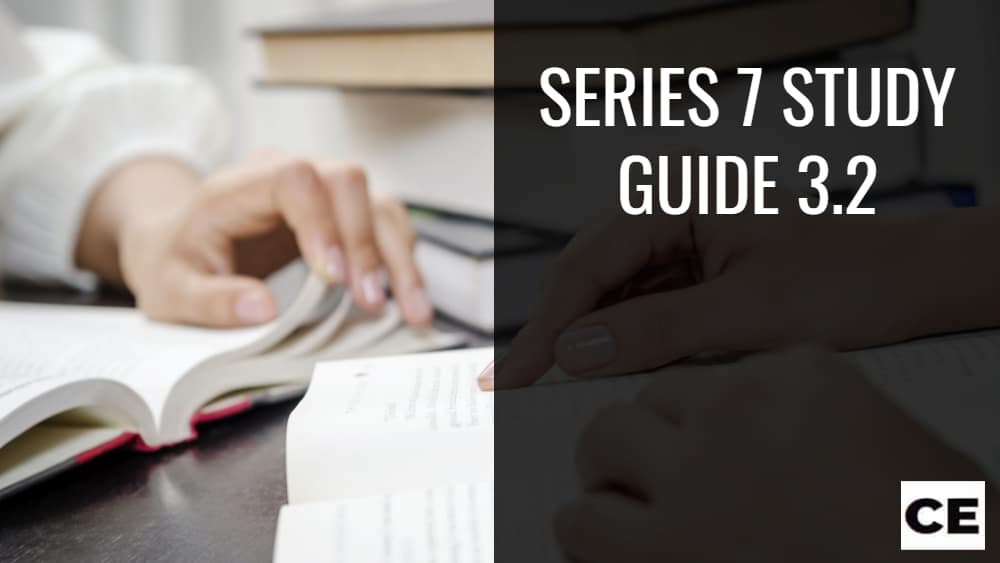Hello, our dear reader.
Welcome to our insightful article on Series 7 exam prep.
This is the first article in our Series 7 exam study hub.
In this session, we’ll give you an overview of the articles in the study hub and how to navigate the hub.
At the end of the session, we promise you’ll have tips to prepare for the Series 7 exam and strategies to pass the exam.
In summary, we’ll cover:
- How to navigate the Series 7 study hub
- Tips to prepare for the Series 7 exam
- Strategies to take the Series 7 exam
Let’s get started right away.
Other free series 7 study materials:
- Series 7 exam prep
- Series 7 study plan
- Series 7 study guide
- Series 7 practice exams
- Series 7 flashcards
- Series 7 cheat sheet
- Series 7 Exam FAQ
- Best Series 7 study materials
How to Navigate the Series 7 Study Hub
Our Series 7 exam study hub is exactly what you need when preparing for this top-off exam.
We’ve put together comprehensive articles on preparation and taking the Series 7 exam.
There are also several study tools you can leverage.
Here is how you can navigate the hub.
The drop-down menu at the top gives you a full list of the articles in the Series 7 study hub.
You can simply click the article you want to read, and you’ll be directed straight into it.
The second navigation is the content outline of the Series 7 exam prep article.
Navigate this article easily by clicking any topic on the menu.
There’s also sidebar navigation that gives you a quick outline of the topics in this article.
You can find this sidebar on the bottom right when using a mobile phone.
You can easily navigate the different topics here using the sidebar.
That said, let’s discuss in brief the contents of each of the articles in the Series 7 exam study hub.
Download the Series 7 study plan for different study timeframes.
We have one, three, six, and twelve months study calendars just for you.
Further, we’ve discussed key pointers to help you make the most of the Series 7 study calendar.
Apart from that, we’ve given you a breakdown of how long it will take you to study for the Series 7 exam.
Here you can check our Series 7 study plan.
This article gives you an overview of each of the four sections of the Series 7 exam content.
Each section has links to the different chapters’ study guides.
The study guides give you an overview of the key concepts you’ll need to cover in preparation for the general securities representative exam.
We’ll also share with you how the study guides can help improve your exam preparation and the importance of using them.
Here is a link to our Free Series 7 study guide.
Practice exams are essential for FINRA exams.
They give you a simulation of the actual exam.
In this article, you’ll have access to four full-length Series 7 practice exams.
There are also practice questions for each of the four exam domains.
The practice exams will help you identify your areas of weakness, and then you can take more practice tests in the domains you are less conversant in.
That’s not all!
We’ll explore the Series 7 exam, what the four domains contain, and how the practice exam and tests can help strengthen your exam preparation.
Here is a link to our Free Series 7 practice exam and practice quizzes.
Have the most comprehensive Series 7 online flashcards.
These flashcards cover definitions and key concepts you’ll find useful throughout your studies.
You can shuffle, star, switch front and back or simply retrieve the previous card.
This article also highlights strategies for getting the most out of the cards and why these cards must be part of your study tools.
Here is a link to our Free Series 7 Flashcards.
Cheat sheets concentrate all the important information on a single central point.
Here, you’ll find a downloadable cheat sheet for your use.
You’ll also learn what you can do to make the most of our Series 7 cheat sheets.
Here is a link to our Series 7 cheat sheet.
In this article, we highlight our top picks in Series 7 exam study materials.
Our top Series 7 exam prep courses include Securities Institute of America, Knopmanmarks, ExamFX, Kaplan Financial Education, Securities Training Corporation, and Achievable.
We share why these Series 7 prep courses’ providers stand out and their areas of weakness.
We also outline the study materials they provide and how long you have access to the materials.
Here is a link that talks about the Best premium Series 7 study materials.
This is the last article in the series 7, answering all the questions you might have concerning the Series 7 exam.
Here is link to our Series 7 exam frequenntly asked questions page.
Tips to Prepare for the Series 7 Exam
All Financial Industry Regulatory Authority exams require serious preparation, and the Series 7 exam is no exception.
Hence, we want to share some of the best ways to study for the Series 7 exam.
Here is how to pass the Series 7 exam.
Make a Study Plan
First things first, create a study calendar to help you cover Series 7 exam content.
To make a comprehensive study plan, first, go through FINRA’s exam content outline to understand the exam concepts.
From there, create a study calendar that covers the four domains of the Series 7 exam.
Better yet, you can download our study calendars with different study timeframes.
The study time is allocated depending on the calendar you choose; one, three, six, and twelve months.
Ideally, you should spend around 80-100 hours preparing for the exam if you have the background experience and 150 hours if you are green in the securities industry.
Another important aspect to consider is breaks.
Have at least 10 minutes break before moving to the next topic.
Using a realistic study calendar that not only covers the exam content but also gives you time to review the practice tests will make your test prep less stressful.
Establish a Study Routine
Having a study calendar is one thing, and sticking to that calendar is another.
The goal is to establish a routine early on so you can have a few hours of study daily.
You need to balance your normal life with the Series 7 test prep.
Have regular study time.
This will help you retain information over time rather than cramming for the exam.
Passing the Series 7 exam requires concept mastery.
As you study, remember to take a day or two off to rest and let your mind absorb what you’ve been learning.
Finally, establish a sleep pattern to curb anxiety.
You need a good night’s sleep in the last week before the exam.
When you are well-rested, your brain works better.
Focus on Learning Concepts
Passing the Series 7 exam requires thorough study.
And you won’t pass if all you do is memorize the information.
What happens if your memory fails during the actual exam?
Your guess is as good as ours.
That leaves you with one option.
Read to understand the material.
The Series 7 exam focuses on financial instruments, such as municipal securities, options, bonds, and equities.
You’ll also learn about the nature of various securities.
Given that the topics are weighted differently, you want to spend your study time wisely.
While things like corporate bonds and options make up around 20% of the exam, investment recommendations, suitability of investments, transferring assets, and maintaining appropriate records are about 75%.
That tells you where most of your study should focus.
But that doesn’t mean you should neglect the less weighted topics.
Balance your study time accordingly.
If you find some concepts challenging to grasp, break down the topic into bite sizes.
You can also use flashcards to reinforce the information.
In case of challenging maths questions, draw diagrams.
Remember the Series 7 exam tests your understanding through practical questions.
FINRA would want to know if you can incorporate all the lessons learned to make a suitable investment recommendation for clients.
So, whether you’ve restored to online training, in-person classes, or a self-study package, make sure your Series 7 exam prep time is dedicated to understanding the concepts.
Use Practice Questions to Check Comprehension
Practice questions allow you to test your understanding of the Series 7 exam.
Hence, it should make a good percentage of your Series 7 test prep.
Do as many Series 7 practice questions as possible to know your areas of weakness and strength.
Suppose your prep course provider has question banks, make the most of the study tool to grasp each topic.
Pay more attention to the areas you are weak in.
Take Full-Length Series 7 Practice Exam
A full-length practice exam is the best way to study for the Series 7 exam.
Series 7 practice exam gives you a peak of the actual exam.
These exams mimic the real ones in structure, format, timing, and weighting.
The Series 7 exam is 3 hours and 45 minutes.
Taking the full-length Series 7 practice exam trains you to take the exam within this time frame.
If you are performing well in the Series 7 practice tests, there is a high chance of performing well in the exam.
The opposite is also true.
Suppose your prep course provider has a pass guarantee.
You are lucky.
If you pass the green light exam and take the exam within the given timeframe, there are high chances that you’ll pass.
If you don’t, they’ll refund you or help you retake the exam.
Aim for a score between 80-85 in the practice exams.
Consistently getting 80 and above means you are well prepared for the exam.
Further, the first and last 25 questions in the Series 7 exam are simple.
However, the questions in between tend to be challenging.
The practice exam will help you familiarize yourself with this structure so that you don’t panic when things get tough in the real exam.
Strategies to Take the Series 7 Exam
We’ve tackled how to study for the Series 7 exam.
And even with preparation, you are prone to get anxious during the exam, whether you are a first-time test-take or not.
To help you stay calm and take the exam with confidence, here are Series 7 exam tips.
- Read the whole question and all the choices instead of scanning for keywords. This will help you note all the important information in the question.
- Make a mental note of keywords, e.g., not, unless, or except in the questions.
- Immediately after the exam begins, write formulas and key points on the scrap paper provided.
- Focus on the facts that will help you answer the question.
- If unsure of the correct answer, eliminate all the wrong answers and settle for your best guess.
- Suppose you don’t know the answer. Don’t waste time there. Take a guess and mark it for review. You’ll return to it once you are done.
- Don’t lose track of time.
Next Step for Studying for the Series 7
The Series 7 exam is regarded as one of the most challenging FINRA exams.
For that reason, we’ve created a study hub with all the information you need to excel.
You can access our study calendar, cheat sheets, study guide, practice exams, and flashcards to better prepare for the exam.
There is also a whole article answering all your questions concerning the Series 7 exam.
Besides the excellent resources, we’ve highlighted some tips to make your exam prep easy.
So, take your time to navigate the hub and make the most of the Series 7 study resources.
Series 7 FAQs
How long does it take to prepare for the Series 7 exam?
The FINRA Series 7 exam takes around 80 -100 hours if you have experience and 150 hours if you don’t. The key is creating a study plan to help you put in those hours from the beginning. Also, find the best Series 7 exam material.
Is the Series 7 exam difficult?
The Series 7 exam is the most difficult FINRA exam. The exam has a pass rate of 65%. It has 125 multiple-choice questions that take 3 hours and 45 minutes to complete. To pass, test-takers must score at least 90 questions.
What should I study for Series 7?
Here are the topics you need to study for the Series 7 exam:
– Life insurance and annuities
– Client and margin accounts
– Taxation
– Retirement plans
– Mutual fund and exchange-traded funds
– Options
– Municipal bonds
– Debt securities
– Equities
– Several rules, regulations, products, and finance concepts
What are some strategies to ace Series 7?
– Create a study plan
– Have a study routine and stick to it
– Settle for the best Series 7 exam materials
– Focus on learning the exam content
– Make the most of Series 7 practice tests
– Take full-length Series 7 practice exams
– Review any knowledge gaps
How long is the Series 7 exam?
The Series 7 exam takes 3 hours and 45 minutes. You can only take the exam through sponsorship by a FINRA member firm after working for them for no less than four months. You have 30 days window to enroll for the exam in a Prometric center once you’ve registered.
What are the topics in the Series 7 exam?
– Seeks Business for the Broker-Dealer from Customers and Potential Customers
– Opens Accounts After Obtaining and Evaluating Customers’ Financial Profile and Investment Objectives
– Provides Customers with Information About Investments, Makes Recommendations, Transfers Assets, and Maintains Appropriate Records
– Gets and Verifies Customers’ Purchase and Sales Instructions and Agreements; Processes, Completes and Confirms Transactions
What are the Series 7 exam requirements for passing?
The passing score for the Series 7 exam is 72%. That means you must score 90 out of the 125 exam questions. Each question is allocated around 48 seconds, bringing the total exam time to 3 hours and 45 minutes. To become a registered representative, you must pass this exam.
References









